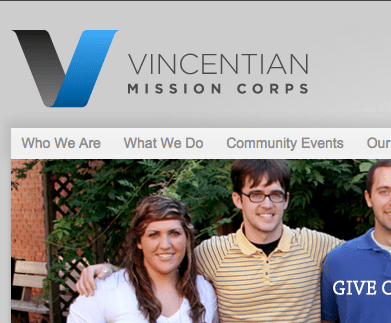From the front lines of Affordable Care Act

Healthcare coverage – What’s the real cost? From the front lines of Affordable Care Act
Madeline Gemoules serves at Mercy Neighborhood Ministries with Vincentian Mission Corps in St. Louis and offers this insight
The St. Louis Metropolitan area is known for its nationally ranked hospitals and state-of-the-art Federally Qualified Health Centers (FQHC). For those residents who have health insurance, St. Louis does a pretty good job of keeping them healthy. And after the implementation of the Affordable Care Act (ACA), things were looking up for those caught between affording quality health insurance and not qualifying for Medicaid. But when Missouri decided to opt out of the ACA’s Medicaid expansion law, we guaranteed that over 300,000 Missourians would continue to live without health insurance.
So how does opting out of Medicaid expansion affect so many individuals and families? When Missouri legislators chose not to expand Medicaid, those who could apply for Medicaid remained below 18% of the federal poverty line. A family of three making $19,790 annually is considered to be on the poverty line, meaning this family would have to make less than $4,453 per year to qualify for Medicaid. And in states where Medicaid was not expanded, only those making 100% or more of the federal poverty line can qualify for lower premiums and lower out-of-pocket costs on Marketplace insurance plans. Now imagine this family consists of a single mother and her two children. The mother works a full time job at minimum wage. (The minimum wage in Missouri as of Jan 1st 2015 is $7.65.) Her annual income comes in at just under $16,000. If Medicaid was expanded in Missouri, those individuals or families making up to 120% of the federal poverty line may be eligible to enroll in Medicaid. But for a family of three making $16,000 a year in Missouri, affordable health care is out of the question. This mother is now stuck in the gap with 300,000 other Missourians.
And while 300,000 Missourians seems like a large number, to many, it is only a number. Working as an outreach coordinator at Mercy Neighborhood Ministry, I see the Medicaid gap grow wider and wider every day through the individuals I meet. And as Mercy continues to do an amazing job helping individuals find affordable insurance through their ACA grant, there are still so many that do not qualify for lower premiums.
This fall, while working with several community partners to provide free flu shots to folks who are uninsured or who have limited incomes, I was blessed to meet a young, single mother who shared her story with me. She was raising three children, all who were sick with the flu. She worked full time, and after taking time off work (without pay) to take care of her children, she couldn’t also afford to get sick herself, either forcing her to take more time off (without pay) or possibly lose her job. After receiving her shot, she thanked the nurse and me incessantly, which warmed my heart, but called me to question deeper.
Catholic Social Teaching asks us to consider greatly the option for the poor and vulnerable. Where does our societal moral conscience stand when so many are without medical insurance and therefore cannot access affordable healthcare? We are asked to take these people into special consideration and remember that they have inherent human dignity and are deserving of basic human rights. People living within the Medicaid gap are not faceless strangers, but our neighbors in Christ. This leads me to believe that Medicaid expansion is not just a political issue, but a moral one. As Missouri legislators return to work in 2015, please pray, contemplate the Vincentian question, “What must be done?”, and consider taking an active role in the expansion of Medicaid in Missouri.
“We should assist the poor in every way and do it both by ourselves and by enlisting the help of others…. To do this is to preach the gospel by words and work.” – St. Vincent de Paul
Works Cited
“2014 Poverty Guidelines.” U.S. Department of Health and Human Resources.., 2014. Web. 8 Jan. 2015
<http://aspe.hhs.gov/poverty/14poverty.cfm>
Kurz, Richard S., and Darcell P. Scharff. A Crisis of Care:The Community’s Aerspective on Health Care in St. Louis City. Rep. New York: HarrisInteractive, 2003. Print.
“Low Cost Marketplace Health Care, Qualifying Income Levels.” HealthCare.gov. N.p., 2014. Web. 12 Jan. 2015.
<https://www.healthcare.gov/lower-costs/qualifying-for-lower-costs/>
“Medicaid-Marketplace Overview.” Missouri | Medicaid.gov. N.p., 2014. Web. 12 Jan. 2015.
http://www.medicaid.gov/Medicaid-CHIP-Program-Information/By-State/missouri.html
Emily Bland
Assistant Director, Vincentian Mission Corps
https://catholicvolunteernetwork.org/program/vincentian-mission-corps-3
2912 Arsenal Street
St. Louis, MO 63118
(314) 771-1474 (Main Office)
(314) 561-4600 (Olive Office)
(314) 440-2700 (Cell)
But he’s already made it plain how to live, what to do,
what God is looking for in men and women.
It’s quite simple: Do what is fair and just to your neighbor,
be compassionate and loyal in your love,
And don’t take yourself too seriously—
take God seriously.
Micah 6:8







0 Comments